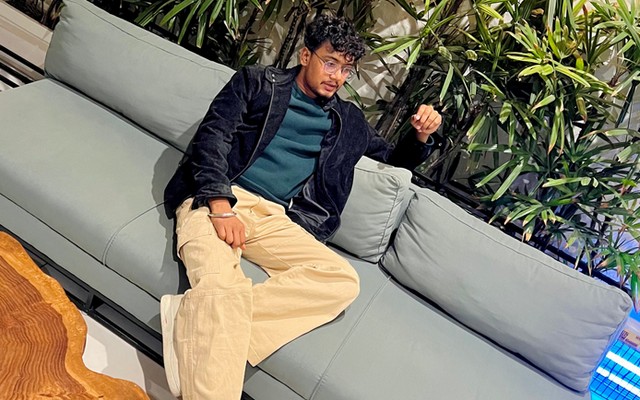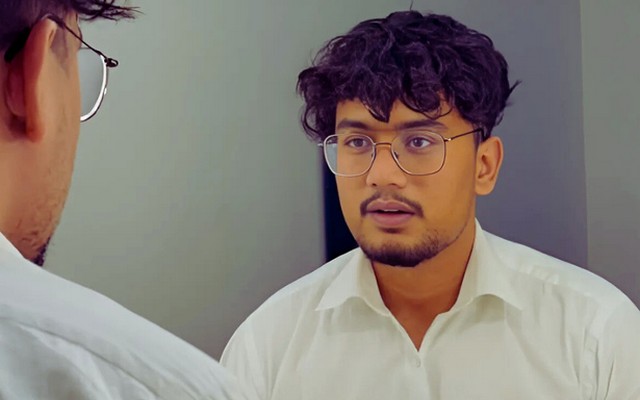From Shabad Kirtan to Punjabi Beats – The Rise of a Music Producer
Tell us about your journey. How did it all begin? Did you formally learn music?
I have always been deeply connected to music. In school, I used to perform shabad kirtan, and in college, I sang boliyan in luddiyaan, jhoomer, and bhangra performances. I continued learning music through YouTube while pursuing my studies. Eventually, I decided to move to Mohali to focus on my career. Initially, I worked under the name ‘Offshore,’ but for the past six months, I have been working as Sobit.
What is your real name? How did you come up with the name Sobit?
My real name is Simranjeet Singh. Sobit was actually my pet name, given to me by my family. In villages, it’s a common name, and as a child, I found it unique. Over time, I realized I could turn it into my professional identity, making it a name people would remember.
Where do you belong to?
I hail from Makhana village in Hoshiarpur. I did my primary schooling in Bhogpur and senior schooling at IITE Academy, followed by graduation from DAV College, Hoshiarpur.
So, you completed your studies before taking up music as a career?
I was always inclined toward work and stayed busy, so I hardly found time for my exams. I ended up dropping out in my third year after two years of college.

What was your family’s reaction when you dropped out and chose music as a career?
Even though I dropped out, I was working and earning well. So, it wasn’t like I was wasting my time. My biggest inspiration has been my uncle, S Rishi, known for songs like Qismat and Hobby. He is an artist in Canada, and I grew up watching him perform. I often accompanied him to shows, which gave me firsthand experience of the industry.
They say there is groupism in the industry. Did you experience that?
I consider myself lucky because I met great people who guided me well. I was already aware of how the industry works, so I never had bitter experiences. I feel that those who face issues often lack awareness of how to navigate the industry. I don’t have regrets—every mistake I made taught me something valuable.
Who would you credit for being your guiding light in the industry?
There are so many people! Shivam Kathuria Veera, Jaggi Bathinda Baaiji, and Fauji Bai have supported me a lot since I started working as Sobit. I met them after shifting here, and they helped me tremendously.
As a music producer, how do you benefit from your work compared to singers who get live shows?
Music production mostly happens behind the scenes, whereas singers are the face of the audience. But within the industry, everyone knows who is doing what. When a song becomes a hit, people notice the music producer behind it, even if they don’t always say it aloud.
hat is your take on the growing use of audio streaming platforms? Are they good paymasters?
Right now, streaming platforms don’t pay much to music producers. About 25% of the revenue is divided among the lyricist, composer, and vocalist.
Do you think music producers put in more effort than composers?
I don’t think so. Every role—lyricist, singer, music producer, and composer —is equally important. We all sit together, brainstorm, and contribute to the final piece. Singing is tough, and writing isn’t easy either. I work as an independent artist, vocalist, and lyricist, so I understand the effort involved in each role.
Collaborations are trending. What kind of collabs work best in today’s music era?
Honestly, nothing is guaranteed to work. It all depends on the audience. Some songs go viral unexpectedly, while others don’t perform as expected. Marketing plays a role, but at the end of the day, content is king. Look at Sidhu Moosewala—his international collaborations were huge successes. Similarly, Navaan Sandhu’s Kaale Angoor with Billa Bakshi was a great example of staying true to one’s roots while experimenting. The key is to create good, unique content, no matter the scale of the collaboration.
Do you have a dream collaboration?
Yes, with Satinder Sartaaj Sahib. I have always admired and listened to him.
Since he writes and sings his own songs, how would you collaborate with him?
I’m not capable of singing alongside him, and he hasn’t collaborated with anyone before. But I believe I could work with him as a music producer.
Punjabi music is on a grand scale now. Have you tasted success at that level?
Success is a journey. Artists like Karan Aujla, Diljit Dosanjh, and Sidhu Moosewala have achieved massive success, and their journeys are still ongoing. If I fixate on reaching a certain level and stopping there, it limits growth. I am a spiritual person and believe that what’s meant to happen will happen in its own time. My focus is on steady progress, step by step.
How did you handle rejection in the early days of your career?
Rejections never really bothered me. If I ever got stuck, I would take a moment to process it and then find a way forward. I believe that if you help yourself, God helps you too.
Which has been your biggest song so far? Which is your personal favorite?
I have many favorites, but Assault and 3-17 by Manavgeet Gill received significant appreciation. They are among my finest works. Artists often upload samples for music producers.
Any advice for them?
My advice—don’t have expectations. Expectations lead to disappointment. Sometimes, artists ask producers to create a song for free, promising that they’ll show it to a music company and figure out payments later. You might do one or two tracks for exposure, but never assume they will come back to you. If you work without charging today, it means you were never paid at all. I have never expected anything from anyone, and I hold no grudges.
Are you open to letting go of your credit for a project?
It’s my skill, my creativity. If someone steals one tune, I’ll make a hundred more. The human mind has built spaceships and satellites —music is just entertainment. If someone takes one idea, I’ll create plenty more.
Do you face creative blocks? How do you overcome them?
Yes, and I believe even the greatest music producers face them. Creativity isn’t a 9-to-5 job. When I meet different artists, I see various creative perspectives, and sometimes, a track doesn’t come together immediately. When that happens, I take a break, work on something else, and revisit it later. The key is not to let pressure build up.
Which contemporary artist’s work do you admire?
I really like Starboy X’s work. It’s authentic and inspiring. I haven’t met him yet, but I appreciate his music.
You also sing. Where do you see yourself in the next 10 years?
We are just getting started. I haven’t planned 10 years ahead, but my goal is to improve every day.
What advice have you received from industry seniors about relationships in the music business?
Many people have advised me to stay observant and work smartly. They often tell me, “Chote bhai, isse tarah chalna chahiye.” I’ve been fortunate to meet people who guided me well.
You have a striking appearance. Do you get extra attention from the opposite gender?
No, nothing like that. I keep my personal and professional life separate. Work is work.
Any message for our readers?
I don’t think I am in a position to give advice—there are many wiser people out there. But I will say this: We have a lot of exciting projects in the pipeline. Stay tuned!


